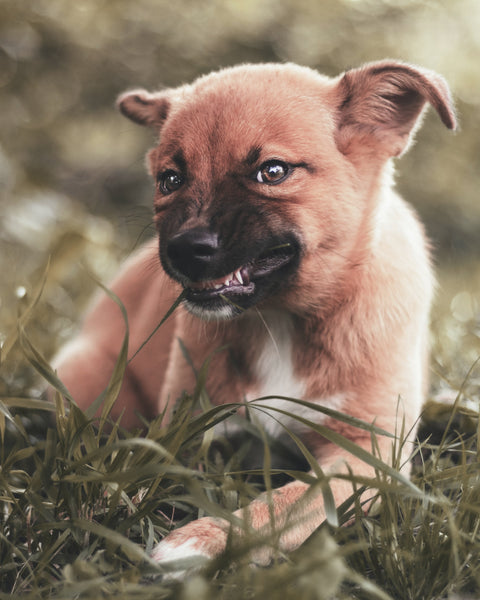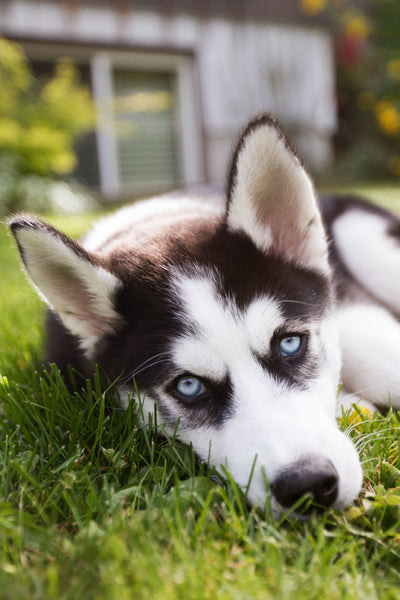A common assumption among pet owners is that dogs eat grass to soothe an upset stomach—if you’ve ever seen your dog eat grass and then vomit shortly afterward, you understand where this assumption came from.
However, it’s not entirely clear why dogs eat grass. It may be an instinct, a physical need, or a psychological need… or it may just be one of those quirky dog behaviors.
If you’re concerned about your pup’s grass-eating habits, you’re not alone.
Reasons Why Dogs Eat Grass
The most commonly understood explanation for why dogs eat grass is that it’s a remedy for an upset stomach. However, some experts see grass-eating behavior as a “chicken or the egg” scenario: what came first, the grass or the upset stomach? In other words, did your dog eat the grass to soothe his already upset stomach, or did the grass cause his upset stomach?
There are other possible reasons why dogs eat grass, too. Perhaps it’s simply an instinctive behavior. After all, your pooch’s ancestors weren’t exactly eating kibble on a daily basis! In fact, many modern wolves have been observed to eat grass.
Because dogs are omnivores, they need a variety of ingredients in their diet, including vegetables. Grass can be a good source of fiber, which helps to promote healthy digestion.
Your dog may also eat grass simply out of boredom or curiosity. It’s not a rare occurrence to have to tell your pup to “leave it” after he tries to explore something interesting with his mouth! Plus if Fido regularly receives a response when eating grass, he may continue to do so as a way to seek attention.
Eating grass may also be a self-soothing comfort mechanism for dogs with anxiety, especially those who are feeling lonely after spending a lot of time in the backyard.
It’s also possible that your dog enjoys eating grass for a simple reason: he likes the taste and/or texture! Some dogs especially enjoy munching on new, fresh grass in the spring.

Is Eating Grass a Problem?
Whether or not you should worry about your dog’s backyard snacking habits depends on a few different factors. Generally, occasional grazing isn’t a cause for concern—as long as it’s not regularly associated with a sick dog.
While the grass itself isn’t necessarily problematic, you should also be aware of any herbicides, pesticides, or other chemicals on the grass that may be harmful to your pooch. Plus, a grass-eating habit may lead to eating other plants, some of which may be more harmful than others.
Snacking on grass may also increase your dog’s risk of intestinal parasites, especially if dogs and other critters are using your yard as their bathroom. As a precaution, make sure to stay up-to-date on your pet’s pest prevention treatments.
If your dog is frequently or excessively eating grass, especially if accompanied by signs of sickness, it doesn’t hurt to consult your vet to rule out or deal with any health issues.

How to Stop Your Dog from Eating Grass
If your dog simply grazes on grass from time to time, you likely don’t need to worry. He may just be exploring his surroundings or doing what his ancestors did.
However, if you’re worried about your pup’s grass consumption or don’t want him snacking on your lawn, there are a few steps you can take.
Train your dog to stop eating grass by redirecting his behavior. For best results, offer him a better alternative rather than simply telling him “no.” For example, if he’s about to grab a mouthful, give a verbal command or direct him elsewhere, and offer a treat whenever he complies.
If your dog’s behavior is caused by a nutritional deficiency, talk to your vet to make sure he’s eating a suitable diet with sufficient amounts of fiber.
For dogs who eat grass as a result of anxiety, behavioral training or dietary changes won’t resolve the issue. Instead, focus on alleviating your dog’s anxiety with some of our favorite remedies.
If boredom is the culprit, be sure you’re providing your dog with plenty of exercise opportunities, along with fun activities such as games and chew toys. Plus, if your pup is getting plenty of quality time with his favorite human, he’s less likely to act out in attention-seeking behaviors.
Promote healthy digestion and intestinal health with PetHonesty’s Keep Grass Green Chews. Not only do these chews promote a healthy pup, but they also promote a healthy lawn. Along with encouraging regular and healthy bowel movements, these tasty chews also balance nitrogen levels in your dog’s urine in order to keep your lawn looking lush and green.
Sources:
https://vcahospitals.com/know-your-pet/why-do-dogs-eat-grass
https://pets.webmd.com/dogs/why-do-dogs-eat-grass
https://www.akc.org/expert-advice/health/why-does-my-dog-eat-grass/
https://petcheckurgentcare.com/why-do-dogs-eat-grass-and-vomit/













